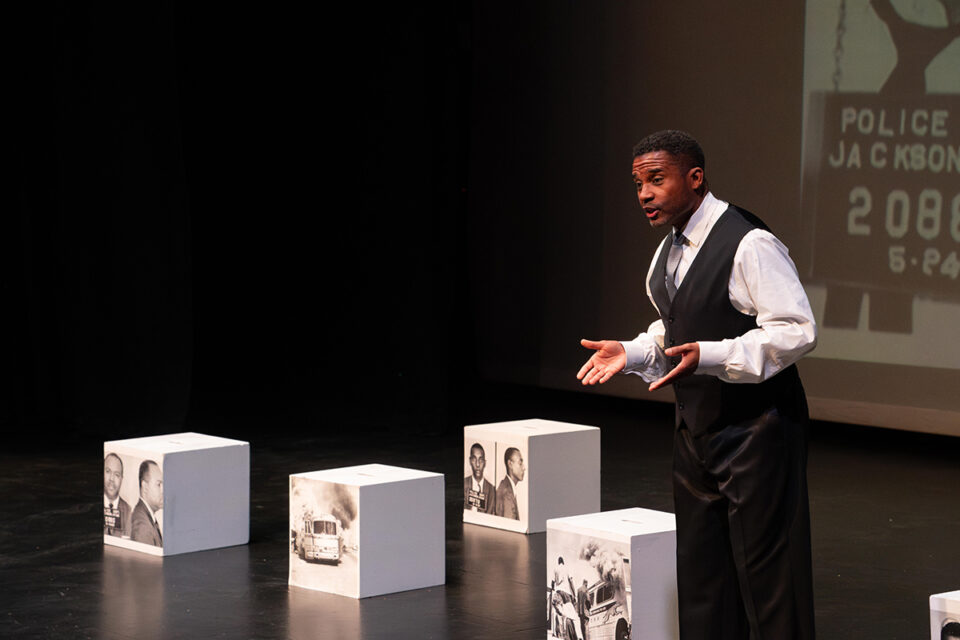Herbert L. White
The Charlotte Post
Mike Wiley works to bring history to the stage.
The playwright and actor starred last month in the one-man show, “Breach of Peace: Freedom Riders of 1961,” at Children’s Theatre of Charlotte. Wiley is no stranger to Charlotte or CTC, where he has performed several shows in recent years like “One Noble Journey,” the story of Henry “Box” Brown, an enslaved man who transported himself to freedom by hiding in a box; “Tired Souls: King and the Montgomery Bus Boycott,” and “A Game Part about Jackie Robinson, who broke Major League Baseball’s race barrier in 1947.
In “Breach of Peace,” Wiley, a Duke University professor and co-director of America’s Hallowed Ground, which highlights notable sites of the civil rights movement, takes audiences for a ride with the Freedom Riders, who challenged transportation segregation on buses in the Deep South. His goal is to help young people understand the challenges marginalized people faced and the heroism needed to overcome them.
“When I started presenting my own work 25 years ago, I wanted to go into presenting these histories, making these histories walk and talk for elementary, middle, high school as well as public performances,” Wiley said. “I wanted to present this important work, but I also want to make sure that it was accessible to folks of all ages, so I set out to utilize a form of performance in it being solo …in direct address, speaking directly to the audience, utilizing audience participation, sometimes even bringing an audience member on stage to portray a character opposite me.”
Although Wiley’s performances are about serious subjects and major historic events, he also injects levity as a way of connecting actor and audience.
“I wanted to be able to use a little bit of comedy in all of my work, regardless of what play I’m doing, whether it’s my play about Jackie Robinson, whether it’s my play about the Montgomery Bus Boycott, even Emmett Till to a small degree,” he said. “I utilize a bit of humor, which, in my mind, is basically adding sugar to this very important medicine that audiences need, especially young people, need to hear and learn these histories.”
In a one-man production, Wiley plays a range of characters from civil rights activists to Birmingham public safety director Bull Connor, a staunch segregationist who battled civil rights activists. The key to capturing the essence of characters, Wiley revealed is in tone of voice, mannerism and posture. His job is to set the stage and mood.
“I portray myself in the opening of the play, explaining, in a very small, short way, who the Freedom Riders were and why we should know about them,” he said. “And then from that point forward, I’m John Lewis, I’m Jim Farmer. I am Lucretia Collins, I am Stokely Carmichael, but I’m also Bull Connor, as well as a number of other individuals throughout the world of the play. What I do through posture and voice, I become those individuals on stage before the audience, and that’s how I tell the story in a unique way of the Freedom Riders, becoming all of those individuals as best I can … starting early on with John Lewis, not just John Lewis, starting in Washington, D.C., with the Freedom Rides, I start with John Lewis as a small child, telling the story of him growing up in Alabama just outside of Montgomery, and how he felt the very first time when he was 13 or 14 and he heard Dr . [Martin Luther] King speak on the radio, and how that propelled him to do many of the things that he accomplished or did in his adult life.”
Improvisation is a skill Wiley has sharpened over his career, which is required as a solo performer. In that regard, he acknowledges similarities to standup comedians who adjust on the fly. He cites Richard Pryor and Bob Newhart as storytelling inspirations.
“It is very much like stand up, especially those improvised moments that happen throughout all of my plays,” he said. “I do nine different solo productions, and all of them have some improv or some improvisational moments through throughout, so I look at it like stand up. I have to be prepared with whatever might happen, either in the audience, coming from the audience, or happening on stage in the process.
“And also, much like stand up, all I have is a simple set. With this set, with this play, it’s just six white blocks with mug shots on them. Or with my play about Henry Box Brown, the enslaved man who mailed himself to freedom, it’s just a wooden box. With Jackie Robinson, it’s just a bench that you might find in a sports locker room, but at the end of the day, it’s just like stand up and I just don’t want to use a bunch of bells and whistles to help tell this story.”

